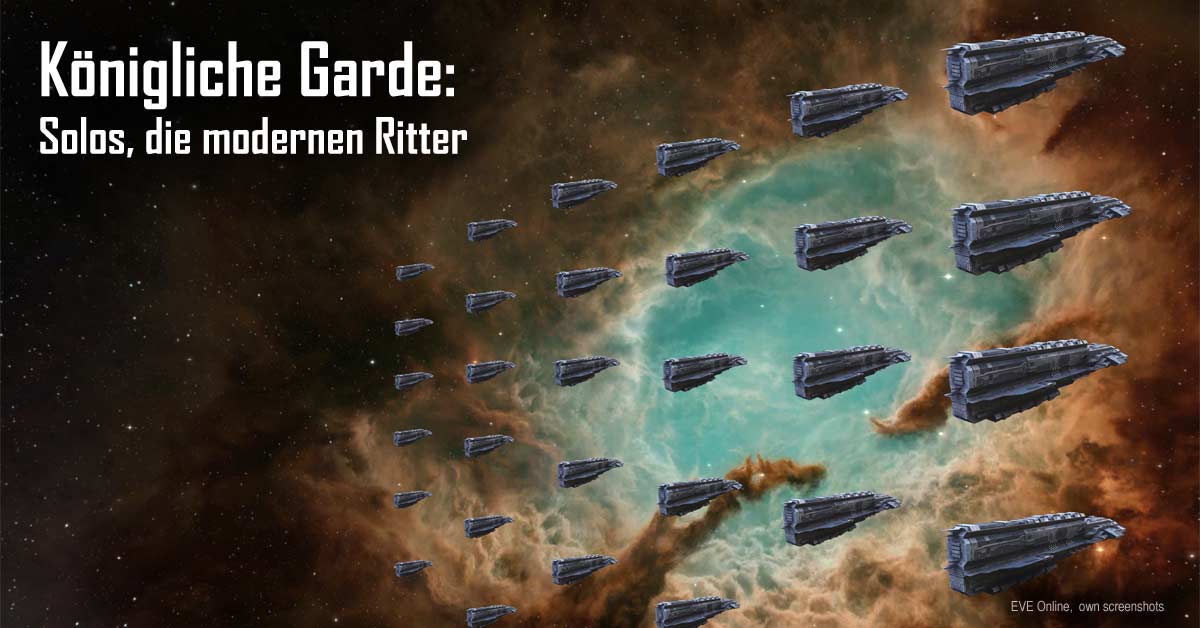
3050 Gründung der königlichen Garde von Marduk

Die Garde besteht aus ca. 150 schweren Kreuzern, die jeweils von nur einer Person geflogen werden. Die Schiffe sind hochautomatisiert. Sie werden von den Piloten oder deren Familien selbst finanziert.
Die Mitgliedschaft bei den Solo-Fliegern ist eine Ehre. Sie ist für wohlhabende Familien, die nicht zur ersten Siedlerwelle gehören, eine Möglichkeit, in den (niederen) Adel aufzusteigen. Die "Verpflichtung als Solo" ist gleichzusetzen mit einem Ritterschlag.
Vor etwa 200 Jahren begann der sogenannte Barbarensturm. Damals fielen moderne Waffen in die Hände von archaischen Gesellschaften und Völkern mit anderen Moralsystemen. Die meisten hätten wohl nicht selbst so hochstehende Technologie entwickelt und wären nie zu einer Gefahr für die interstellare Zivilisation geworden. Aber mit dem Zugriff auf schnelle Raumschiffe und automatische Waffensysteme wurden ihre Ethik, ihre Sitten und Handlungsweisen, interstellar wirksam. Das hatte fatale Folgen für die Hochzivilisationen der Umgebung.
Der wesentliche Auslöser für diese Entwicklung war der Rückzug des Interianischen Imperiums. Das Imperium kontaktierte viele Völker und versuchte sie in die interstellare Gesellschaft einzubinden. Beim plötzlichen Ende des Imperiums war der Prozess nicht abgeschlossen. Viele kontaktierte, aber noch nicht integrierte Völker, wurden sich selbst überlassen. Das Imperium gab damals Flottenstützpunkte an der Grenze auf, und einige Völker übernahmen die zugehörigen Depots. Dort fanden sie sehr moderne automatische Waffensysteme.
Gefördert wurde die Entwicklung vom gormanischen Bürgerkrieg, bei dem viele Fraktionen Söldner von ihren Heimatplaneten mit modernen Waffen ausstatteten.
Auch Hochzivilisationen trugen dazu bei, dass moderne Waffen in die falschen Hände fielen. Als die Handelsrouten unsicher wurden, heuerte sogar das Solsystem Söldner zum Schutz der Geleitzüge an.
Söldner, die Frachter beschützen, können später auch Handelsrouten angreifen. Das passierte damals immer wieder.
Dann wurden die ersten überraschten Hochzivilisationen von Barbaren angegriffen und manche konnten sich nicht verteidigen. Handelspartner fielen aus, interstellare Verbindungen wurden teuer und die äußeren Systeme wurden unsicher. Nach 50 Jahren befanden sich die interstellar vernetzten Gesellschaften des Sektors in einer schweren Wirtschaftskrise. Einige hatten schon zeitweise unter einer Fremdherrschaft zu leiden, andere versuchten aufzurüsten. Das war schwierig in einer Zeit des wirtschaftlichen Niedergangs.
Mit einer modernen quartären Systemverteidigung, aus Ballistik-Schild, Tiefraumsperren, Minen und mobilen Einheiten, kann man Systeme sogar gegen massive Angriffe befestigen. Aber das ist selbst für wohlhabende Systeme eine teure und jahrzehntelange Anstrengung. Deshalb rüsteten die meisten Systeme nur mobile Kräfte aus. Das war ausreichend gegen Überfälle durch moderne Barbaren, meistens jedenfalls.
Weitere 100 Jahre später hatte sich die Situation so weit verschlechtert, dass viele Völker, Sonnensysteme und Territorialsouveränitäten sogar Probleme hatten, genügend Mittel für eine ständig einsatzbereite Verteidigungsflotte aufzubringen. Als Notlösung wurden deshalb im Krisenfall zivile Schiffe aufgerüstet. Auch bewaffnete Handelsschiffe wurden zur Verteidigung herangezogen. Die Handelsschiffe hatten sich sowieso bewaffnet, um Piraten abzuwehren, seit die Handelswege unsicher wurden.
Moderne Waffensysteme von interstellaren Hochzivilisationen haben ein gewaltiges Zerstörungspotential. Ein einziger leichter interianischer Kreuzer kann einen ganzen Planeten unbewohnbar machen. Solche Waffen waren nun in den falschen Händen und dagegen versuchten sich Handelsschiffe zu wappnen. Deshalb war die Standardbewaffnung von Handelsschiffen in diesen schwierigen Zeiten nicht zu vernachlässigen. Sie leistete oft einen wesentlichen Beitrag zur Systemverteidigung. Die typische Verteidigungsflotte setzte sich zusammen aus eilig mit Lenkwaffenstartern ausgerüsteten Frachtern, bewaffneten Händlern und Einheiten der ordentlichen Marine.
Seit etwa 100 Jahren werden zusätzlich auch wohlhabende Privatleute und Konzerne zum Verteidigungsdienst herangezogen. Selbst in wirtschaftlich schwierigen Zeiten gibt es sehr reiche Individuen (zumindest bei Völkern, die das Konzept des Individuums kennen). Einige profitieren von der Verknappung von Ressourcen durch die problematische Handelssituation, andere profitieren von ihrer Nähe zu den lokalen Regierungen. Viele der Superreichen haben eigene Raumschiffe.
In guten Zeiten gibt es in interstellaren Gesellschaften märchenhafte Reichtümer, tausend Mal größer als die Vermögen von Milliardären in planetengebundenen Regionalökonomien 1000 Jahre zuvor. Auch in schlechten Zeiten reicht es für eigene Raumschiffe, eine Yacht oder einen Interstellar-Jet, mit Waffen, die sich zumindest gegen Piraten zur Wehr setzen können. Und auch in Hochzivilisationen gibt es private Söldner, die davon leben, andere zu beschützen, und dafür in gut ausgerüsteten Schiffen unterwegs sind.
Diese Schiffe sind weitgehend automatisiert. Praktisch alle Funktionen des Raumschiffbetriebs werden von Drohnen, Mikrobots und KIs ausgefüllt. Das beginnt bei Nanotech- oder Biotech-basierten Putzkolonnenschwärmen und geht über Reparaturdrohnen bis auf die Ebene von Managementfunktionen, die sonst durch Offiziere besetzt werden. Meistens haben diese Schiffe nur eine kleine Besatzung, oft sogar nur eine Person: den oder die Eigentümerin.
Viele fliegen solo. Nur der Pilot ist ein Sophont, ein Mensch, im originalen Bio-Körper, als Android oder sogar als Infosophont in die Schiffsysteme geladen. Alle anderen sind unbewusste KIs.
Man nennt sie Solos. Ein Mensch und sein Raumschiff.
Solos sind eine Elite. Sie sind genetisch optimiert und mit Nanotechnik aufgerüstet. Sie haben mehrere parallele Denkprozesse, beschleunigte Verarbeitung und unbegrenztes Erinnerungsvermögen. Ihre geistigen Fähigkeiten werden verstärkt durch spezialisierte Intuitionsquellen: Assoziationsbooster, Strategiesimulationen und taktische Optimierer, deren Ergebnisse durch Implantate in das Bewusstsein eingeblendet werden. Sie sind in der Lage, die vielen Ereignisse bei Auseinandersetzungen im Raum mit zigtausend Teilnehmern in mehreren Sensordimensionen zu erfassen und schnell die beste Handlungsweise abzuleiten. Sie stehen den beschleunigten Upload-Besatzungen von Offensivdrohnen in nichts nach.
Es gibt natürlich immer Ausnahmen, zum Beispiel reiche Erben, die sich ein Schiff leisten, um Solo zu werden. Aber auch diese Leute können Fähigkeitslücken schließen, wenn sie eine kleine Crew anheuern. Nicht alle Solos fliegen wirklich alleine. Manche haben Piloten, Taktiker, strategische Berater, soziale Gefährten oder eine "Nachtschicht", die das Kommando hat, während der Solo schläft, auch wenn das nur zwei Stunden am Tag sind.
Nicht nur die Fähigkeiten sind wichtig, sondern auch das Training. Gute Solos trainieren ständig für Krisensituationen. Sie simulieren Kämpfe gegen KI-Gegner und gegen andere Solos. Das Cockpit eines Solo-Schiffs wird vollständig von Sensoren gespeist. Es ist der perfekte Simulator für taktische Spiele.
Training für den Ernstfall nimmt die meiste Zeit in Anspruch. Solo zu sein ist teuer und zeitaufwändig. Bei den meisten Solos liegt dem Reichtum ein Geschäftsimperium zugrunde. Und auch geerbter Reichtum muss verwaltet werden, umso mehr, wenn der Reichtum auf aktiven Geschäften basiert. Aber dafür bleibt eigentlich keine Zeit. Deshalb delegieren die meisten Solos die Verwaltung ihrer Unternehmen, um ihre ganze Zeit dem Training widmen zu können.
Überall in der menschlichen Sphäre gibt es Solos. In manchen Sonnensystemen nur wenige, woanders tausende. Dort stellen Solos neben bewaffneten Handelsschiffen, aufgerüsteten Frachtern und der regulären Marine das vierte Standbein der mobilen Einsatzkräfte.
Solos tragen normalerweise nicht die Hauptlast einer Schlacht. Dafür gibt es die schwer bewaffneten Nahkampfplattformen, die Schlachtschiffe der Moderne. Die Schiffe der Solos sind eher in der Größenordnung von Fregatten und leichten Kreuzern. Sie sind sehr mobil und auch bei interplanetaren Distanzen und entsprechenden Lichtverzögerungen selbständig handlungsfähig. Deshalb werden sie oft als Scouts eingesetzt, bei Kommandoaktionen oder in größeren Verbänden als schnelle Eingreiftruppe für überraschende taktische Vorstöße.
Solos sind inzwischen so wichtig für die Systemverteidigung, dass lokale Regierungen ihre Verfügbarkeit für den Krisenfall sicherstellen müssen. Man kann sich nicht darauf verlassen, dass die Solos des Systems freiwillig zur Verteidigung beitragen. Deshalb werden wohlhabende Personen verpflichtet, Solos zu stellen und auszurüsten.
Anfangs war das für viele eine große Last. Nicht alle der Superreichen fliegen eigene Raumschiffe. Und die notwendige Bewaffnung geht weit über das hinaus, was man zur einfachen Abschreckung von Piraten brauchen würde, nicht nur bezogen auf die Kapazität, sondern auch bei den Kosten. In der Praxis müssen alle, die es sich leisten können, selbst ein Kriegsschiff finanzieren. Auf der anderen Seite ist die Mitgliedschaft bei der Solo-Komponente der Systemverteidigung etwas Besonderes. Im Vergleich zur regulären Marine mit hunderttausenden oder Millionen Soldaten, ob Bios oder Infosophonten, sind tausend oder zehntausend Solos eine Elite-Einheit. Und so werden sie auch behandelt.
Es ist nie leicht, Superreiche zum Dienst zu verpflichten. Große Vermögen bieten immer Möglichkeiten, sich dem Dienst für das Heimatsystem zu entziehen. Deshalb versuchen Territorialsouveränitäten, die Aufgabe attraktiver zu machen, indem sie Solos auszeichnen und bevorzugen. Das funktioniert besonders gut in feudalen Strukturen.
Auf Marduk ist das Präsidentenamt inzwischen erblich und der Begriff Präsident wird verwendet wie früher ein Königstitel. Die Republik Marduk hat ein Parlament, das von Konzernen und wohlhabenden Familien dominiert wird. Sie nennen sich Abgeordnete, aber sie werden in sicheren Wahlkreisen lebenslang gewählt. Die Bedeutung der Begriffe hat sich verschoben. Man spricht immer noch von Präsidentin und Parlament, aber die wahre Bedeutung und die Wahrnehmung sind eher Königin und Senat. Die Verpflichtung als Solo ist gleichbedeutend mit einem Ritterschlag.
Keine Familie kommt in das Parlament, ohne einen Solo zu stellen. Im Parlament sitzen Vertreter der ersten Siedler, deren Familien einen Großteil der Gebietsrechte im Marduk-Sonnensystem besitzen. Dabei handelt es sich um planetare Territorien in der Größenordnung von Kontinenten, aber auch um Eigentum an Orbitalringen, Orbitalraum, Asteroidenschürfrechten, Extraktionsrechten bei den Gasriesen und systemweite Rechte am elektromagnetischen Spektrum.
Im Parlament sitzt auch der "Geldadel", Familien, die später kamen, aber große Vermögen angehäuft haben. Dort werden die großen Geschäfte eingeleitet. Man kann wohlhabend sein, aber das wahre Geschäft – und dazu gehören die Staatsfinanzen – teilen die Abgeordneten unter sich auf. Da die Abgeordnetenzahl begrenzt ist, ist es nicht einfach, in das Parlament "gewählt" zu werden. Eine Voraussetzung dafür ist, dass man zur Solo-Komponente der Systemverteidigung beiträgt. Und so sind die "Mitglieder der Solo-Komponente der Republik Marduk" eigentlich die modernen Ritter des Königs, deren Familien auch die Senatoren stellen.
Eine besondere Ehre ist die Verpflichtung als Solo für die präsidiale Schutzflotte. Das sind die 144 besten und am besten ausgerüsteten Solos. Es ist praktisch die moderne Prätorianergarde: 144 schwere Kreuzer zum Schutz des Präsidenten.
Nicht nur auf Marduk, auch in vielen anderen Systemen, gibt es ähnliche Entwicklungen. Der Begriff Solo steht für Zuverlässigkeit, Kompetenz, Mut, Unabhängigkeit und natürlich für märchenhaften Reichtum.
In einer Zeit des wirtschaftlichen Niedergangs und der Renaissance feudaler Strukturen sind Solos das Ideal für viele Milliarden Sophonten, die sich ein besseres Leben wünschen.
Mehr Kultur
2078 Neueste Forschung
2090 Adaptive Zusammenfassung
2115 Neuroimplantate
2128 Kinder Gen-Baukasten
2165 Yksityiskohta World Jam
2168 Spaceship Udyama
2231 Vereinte Planeten
2234 Am Ende des Orbits
2326 Kein interplanetarer Krieg
2343 0G-Spiele
2369 Mabesi-Krise
2445 Scum-Festival
2625 Alien-Tiere kommen zu uns
2664 Die Geschichte der Galaxis
2693 Reisen unter fremden Sonnen
2721 Spacedom-Tragödie
2750 VR-Drama Executive Decision
3050 Königliche Garde
3090 Solo Ehre
3131 Roboter und Drachen
3300 Begriffsveränderung
3353 Tor der Kontroverse
Neue Beiträge
3353 Tor der Kontroverse
3361 Erste Menschheit
2158 Space Patrol
2222 Weltraumpiraten
2326 Kein interplanetarer Krieg
3050 Königliche Garde
3090 Solo Ehre
2234 Am Ende des Orbits
2248 Gemini-Katastrophe
2366 Orbitale Ökonomie
2312 Kaio-Artefakt
2333 Metrische Impulsverstärkung
2337 Verschwörung im Orbit
2247 Quantensprung
2284 Trennung der Erde
2321 Isolation der Erde
2205 Unternehmensnationen
2192 Antiexpansionistischer Terror
2179 Private Asteroidenbasis
2231 Vereinte Planeten
Die Besten
(20 von 75)
2091 Baum des Lebens
2197 Mond-Revolte
2205 Unternehmensnationen
2265 Öko-Militarismus
2321 Isolation der Erde
2412 Pontos Mission
2445 Scum-Festival
2501 Extraplanetare Forschung
2535 Tragödie von Cobol
2540 Mukhagni-Zwischenfall
2648 Abenteuerliche Reise
2668 Ultrametalle
2720 Spacedom-Tragödie
2750 VR-Drama Executive Decision
2794 Prophet der galaktischen Händler
2841 Leuchtender Tempel
2956 Chaosmanager
3191 Umzug nach Cobol
3270 12.000 Jahre Geschichte
3340 Strategische Initiative
 3042
Galaxien
3042
Galaxien

 3055
Mehr Menschen leben außerhalb des Sonnensystems
3055
Mehr Menschen leben außerhalb des Sonnensystems